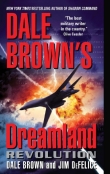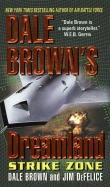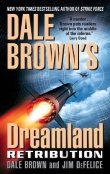
Текст книги "Influx"
Автор книги: Daniel Suarez
Соавторы: Daniel Suarez
Жанр:
Научная фантастика
сообщить о нарушении
Текущая страница: 12 (всего у книги 27 страниц)
CHAPTER 14
Flight
Despite every effort not to be impressed on his journey—Jon Grady was impressed. He’d been sitting in a luxurious leather seat for nearly a half hour before he discovered the hypersonic transport was already under way. It was that quiet. The pilots had the cabin window shields deployed—whether to conceal from him their route or to protect the aircraft he couldn’t tell.
When Grady heard the scramjet kick in, the shield disappeared, revealing a wide window by his elbow that he didn’t think could be made of glass. Below the sun was rising at the far edge of the world.
It was the most miraculous sight he’d ever seen. His mind caught fire as the universal laws paraded before him. He felt inebriated with joy.
Grady guessed they were at least a hundred fifty thousand feet up. Maybe higher. It didn’t feel like they were moving, though he could see the lights of metropolitan sprawl gliding by far below. They must have been doing three or four thousand miles an hour. Maybe more?
Down there was the entirety of the human race. His eyes followed the curvature of the horizon. Unlike with a photograph, the harder he looked, the more there was to see. He hadn’t expected this—that the most magical moment of his life would be given to him by his enemies. Grady couldn’t remove the grin from his face.
After a while he tried to orient himself to the globe—deduce where they were. But “up” didn’t appear to be north. He couldn’t see a recognizable polar ice cap—they weren’t that high. The modified gravity field disoriented him further. It was nearly impossible to tell what he was looking at in the darkness below.
The gravity field was a stable one Earth g. But then again, that might be his technology erasing all sensation of falling. Most people didn’t know that astronauts on the space station were experiencing almost a full g of Earth gravity; it was the fact that they were falling around the Earth that gave the sensation of weightlessness. In fact, it was gravity that was causing their orbital fall—and so the zero gravity sensation was actually being caused by gravity.
Not on this incredible machine. Everything was stable and normal here—like he was sitting in some millionaire’s home theater.
Grady turned to face the uniformed BTC officers seated across from him—young Morrisons both. “I didn’t feel any acceleration—not even when the scramjet kicked in.”
Neither of them answered.
“It’s my gravity technology, isn’t it? You’re canceling out the force of acceleration in the passenger compartment?” He beamed at them. “Amazing.”
He looked again out the window. Too bad this was an evil conspiracy. Otherwise this would really be fun.
“Are we in the mesosphere? We are, aren’t we? You could probably make use of the gravity fluctuations in the mesosphere for additional propulsion. Maybe even stabilization. Is that what you’re doing?”
The Morrison clones just stared back at him.
“I’m right, aren’t I?”
The pilot’s cockpit wasn’t visible from this cabin—in fact, there wasn’t even a door leading to it from where he was. The craft had only been traveling for an hour or so when the glass faded into an opaque surface. Materials science again? It looked like the glass itself had changed from clear to opaque. What innovator was doing time in Hibernity for that breakthrough?
He turned again to his guards, but they stared back at him like statues. No point in asking.
Frustrated that the window shield had come down again, Grady tried to get his head back in the game. It was distracting. It really was. They were rolling out all the stops. Beyond first class. This was infinity class. A private hypersonic jet with a front-row seat to the cosmos. His gravity technology had made it possible. God, he wanted to be working on this.
But there was no way. He remembered all too clearly the cruelty of his captors. The life they had stolen from him and from others. And only a vague sense of the lost memories he’d never get back.
His fellow Resistors had put their faith in him. He would not fail them.
Grady looked around at the burled walnut millwork and the fine leather all around him. This, too, was a gilded cage. He raised his flute of champagne to his guards. “To human ingenuity.”
They stared like Sphinxes.
• • •
The landing a half hour or so later was completely silent and without the sensation of acceleration or deceleration. It was as though they were in a hotel courtesy suite, not an aircraft. Before long a pleasant tone sounded, and his guards removed their seat belts. Not that anyone had needed them.
A black door slid silently upward, then aside, and the guards ushered Grady into a brightly lit hangar. He stood for a moment at the top of the metal stairs. A midnight-blue Cadillac Escalade with diplomatic license plates stood idling below. Dozens of guards patrolled the hangar perimeter, dressed in plain clothes, with long guns slung at their chests. It looked like regular twenty-first-century technology. Grady knew the BTC had outgrown firearms decades ago. These seemed oddly out of place given everything he now knew.
He stepped down the stairway and felt balmy summer air wash over him. The fragrance of mown grass brought an onslaught of memories—hazy and indistinct though they were. He felt so alive. He spotted painted numbers on the hangar door. They glowed in magenta and violet. He felt their invisible geometry. His synesthesia, he knew, but it felt good to be surprised by numbers again.
He turned to a guard. “Where are we?”
“Keep walking.”
Grady glanced back at the cobalt-blue hypersonic aircraft looming over him. Its lines were slanted in antiradar angles, giving it the look of an Aztec sacrificial knife. It was a remarkable machine. Silent. Invisible. Fast. He guessed they’d just traversed half the world in under two hours.
A strong hand grabbed his elbow, and he was soon handed off to a new set of Morrisons standing next to the open door of the Escalade. From the door’s thickness he guessed the vehicle was armored—but crudely. Again, early twenty-first-century technology. No doubt this machine was intended for the public streets. To blend in.
He gestured to the aircraft behind him. “You know, my invention made that gravity propulsion possible.”
“Good for you. Now shut up and get in.” The guard shoved Grady into the SUV.
That meant it was showtime. Grady had roughly thirty minutes to escape once they were under way.
There were a total of six guards in the vehicle, only two of them Morrisons—one on either side of Grady in the middle seat. He guessed the BTC didn’t want to have too many Morrisons in one place in public. Twins were one thing—clones something else entirely.
The two guards up front looked beefy, though. As did those in back. No doubt steroids were as crude as leeches to the BTC. They probably had something much better to pump up their soldiers. The security detail wore blue blazers and slacks—no ties. No guns visible. They looked, in fact, just like diplomatic bodyguards.
There was Scotch and wine on the console in front of him, along with what now seemed like an ancient flat-screen LCD television—no holographic units here apparently. He was sorely tempted to have a belt of booze to settle his nerves, but if he could survive Hibernity, this escape should be no big deal. They couldn’t shoot him. Hedrick needed Grady alive. That’s why they were bringing him to headquarters. He just had to make sure they didn’t nox him before he pulled this off.
Grady nodded to the men up front. “So we’re slumming it in the twenty-first century for the last leg, I see.”
The driver gave Grady a dismissive glance in the rearview mirror.
And then they were under way. With a rude jolt of acceleration that now seemed annoying, the vehicle moved through the hangar doors and out into the night. Before long they were rolling through forested countryside. Lots of deciduous trees and lush undergrowth silhouetted against a moonlit sky.
Grady leaned to the side to look for landmarks in the darkness. “Where are we?”
“Earth.”
The guards cracked up. The one to Grady’s right gestured to the television. “This thing get ESPN?”
The driver nodded. “Yeah. Remote’s next to it.”
Moments later the TV came to life.
“What channel?”
“How the hell should I know? I don’t sit back there.”
Grady watched in bewilderment as a commercial for dish soap came on-screen. It was surreal under the circumstances to watch a CGI sponge dancing across a gleaming kitchen countertop. Given everything that had transpired, it all looked so trivial.
The guard started clicking through satellite channels. “Damn, this thing is slow.”
“Welcome to tech level two.”
Grady turned away from the screen. Instead, he gazed out the window. When was he going to do this? Was it better to escape in the countryside or in the city? They were moving through suburbs now.
He guessed he’d have more places to hide in the city. More resources. And he had to get the evidence he was carrying to someone. That was a whole separate challenge.
By now the guard manning the TV remote had navigated past cooking and travel shows. “What channel’s it on?”
Another guard grabbed the remote. “It’s in the two hundreds.”
He clicked onto a cable news station where a mannish woman in a suit stood before a cluster of microphones. The chyron below her read, “Richard Cotton Trial.”
A couple of the guards roared in laughter, “Cotton!”
“My man . . .”
The woman on TV was in midsentence. “. . . effort. We’re just glad Richard Cotton will finally face justice.”
A guard yelled, “Put the game on. This shit’s been going on for months.”
Grady watched the screen in fascination.
The news cut to footage of a chained prisoner in bulky body armor and a bulletproof helmet being escorted past a phalanx of riot police. Grady recognized Cotton’s bearded face nodding to the cameras.
Grady struggled to hear the news anchor’s voice over the hoots of his BTC guards. “Captured by FBI agents late last year, Cotton was transferred Thursday under heavy guard to federal district court in Chicago, where he faces trial on thirty-three counts of first-degree murder, conspiracy, and use of weapons of mass destruction. The leader of an antitechnology domestic terror group known as the Winnowers, Cotton has claimed responsibility for a decadelong string of bombings focused on eliminating scientists whose research he claimed was ‘an affront to God.’ He has been called a martyr by thousands of admirers for whom his antimodernity message resonates.”
One guard scoffed. “Dipshits. It’s almost too easy.”
On-screen Richard Cotton raised his shackled hands as far up as he could in triumph. The Morrison on Grady’s right chuckled. “What a ham.”
Grady looked from guard to guard. “The FBI captured Cotton?”
The guards all laughed.
“You could call it that.”
Grady scowled at the man. “The FBI is part of this?”
“Hey, Ep, he thinks the FBI can keep a secret.”
They all laughed harder.
The screen suddenly changed to a baseball game—the Detroit Tigers against the Cleveland Indians.
“There we go.”
Grady looked from one guard to another, trying to figure out what they had meant. Apparently there was some joke he wasn’t in on—and which the FBI wasn’t in on either.
Grady leaned forward to see a downtown skyline ahead, lights glittering atop lofty towers. There were Michigan plates on the few cars they passed. Signs on businesses and billboards for local radio stations made it clear they were heading into Detroit. Numbers and letters glowed supernaturally all around him now—his synesthesia kicking in, distracting him with its visual lures.
He needed to stay focused. The time on the dashboard read “11:23 PM.” They’d been traveling for nearly fifteen minutes already.
Another glance to either side. They were driving on a nearly deserted multilane highway. It was bridged over at intervals with cross streets and signs for downtown. There were grassy embankments to either side, leading up to bushes and chain-link fences, with houses and buildings beyond. He guessed they were going seventy.
The guards were absorbed in the baseball game. Grady forced himself to ignore the glowing numbers littered across the TV screen. Focus.
When would he do this? He had to act soon, or they might actually arrive at BTC headquarters.
The Escalade signaled and changed to the slow lane. There were no cars around them at the moment.
No time like the present.
Grady casually picked at the “mole” on his neck, removing it. Then he opened his mouth and placed it on his tongue.
The Morrison to his right gave him a disgusted look.
But before the man could even speak, Grady heard a high-frequency sound as a sudden surge of pressure spread away from his own face, enveloping them both in a fog-like, translucent wave. A wave that rapidly expanded in every direction.
He heard someone behind him shout, “What the—?”
Moments later Grady felt as though he’d been encased in nearly transparent foam. It already filled the interior of the armored Escalade, freezing everyone in place like bugs in amber. He could hear his guards’ muffled speech to the left and right.
Grady tried unsuccessfully to turn his head. He was so thoroughly enveloped by the mysterious substance that he couldn’t even wiggle his fingers.
And then he noticed that the SUV was still going seventy miles an hour. Through the frozen smoke, which extended all the way to the front windshield, Grady could see that they were veering off the highway toward a grassy embankment that led up to street level.
Not good.
With the driver apparently unable to move a muscle—or even to let up on the accelerator—the Escalade edged up onto the shoulder. Once it touched the grass, the SUV curved away upslope. Grady heard muffled curses to the left and right of him, and watched in terror as the vehicle hurtled through a chain-link fence at the top.
Then they were airborne, floating in free fall, the vehicle rolling sideways.
Grady saw lights passing by outside, but after a moment of silence, the SUV thundered down onto its front right corner, doing cartwheels as the armored windows spidered and the vehicle frame twisted around them. Airbags fired, but they barely got out of their cases against the nanocloud—instead, they were forced outward against the doors, blasting two off their hinges.
But through it all, Grady and the men around him floated in airy isolation, completely insulated from the shock of these impacts within the nanofog. Grady felt as though he were watching a hologram unfold all around him.
The Escalade tumbled through another chain-link fence and across a grassy lot until it impacted against a tree—bringing the vehicle to a sudden, violent stop.
Then there was relative quiet as dirt and pieces of debris rained down around the crash.
They had landed right side up at least.
But what now? Grady was still entombed in this bizarre material. He nonetheless felt himself shift in his seat against his seat belt. The moment he tried to expand the movement, he felt the nanomaterial lock him in place again.
Grady tried to recall Chattopadhyay’s advice—which had been woefully brief. But what did he say to do after the material deployed?
There was renewed muttered cursing near his ear . . .
“Grady. You’re fuckin’ dead . . .”
Move slowly toward the exit. That’s what Chattopadhyay had told him. Grady tried to slowly move his hand—and the nanomaterial relented. But the moment he sped up his movement, it locked in on him again.
It was like sheer-thickening liquid then. It would resist rapid deformation but allow slower movement. Grady surmised that once coded to his chemical or genetic signature, this nanomaterial only allowed the cloud’s owner to move slowly—and all other objects would be held fast. Very interesting stuff indeed . . .
Grady concentrated on moving slowly, and sure enough the material permitted motion. It felt like he was encased in a breathable clear gelatin as he moved, but he could move. In a few moments he had his seat belt unbuckled. He rolled slowly toward the right-side door and noticed one of the Morrison clones staring daggers at him through the nanofog. The man couldn’t even move his lips.
“Fuckin’ dead, Grady . . .”
Grady slowly gave him the finger. Then, as he slid past, Grady paused. He could see the guard’s suit coat was partially open, the man’s hand frozen in the act of grabbing a weapon from its holster.
Grady moved his lips slowly. “Nice try.”
Grady also noticed the edge of the man’s wallet in his coat pocket, and he slid his hand inside, encompassing it with his own hand as he withdrew it. It was still a difficult item to draw out, but after a few moments, he fumbled with the handle of the passenger door, pushed slowly outward, and finally slid through the edge of the nanofog as if being born into the world all over again.
Grady tumbled out face forward onto what felt like grass. He rolled back onto his feet and was relieved to discover he could move freely now. He looked back with concern at the open doorway of the armored SUV. The nanofog made it look like the occupants were doing major bong hits inside—except that the smoke didn’t budge. He could see the guards still immobilized. Good.
A glance around showed that the Escalade had hurtled across a local street onto a corporate lawn in front of a ten-story office building—most of which was dark at this hour. The Escalade had plowed through a section of chain-link fence there and slammed into a small oak tree—a surprisingly small one, considering it had stopped the armored vehicle cold and smashed the front end in. The entire length of the vehicle was mangled, its engine steaming and the electrical system dead.
Grady sucked in the fresh air and scanned the streets around him. He’d done it. He was free for the first time in several years. Free of the torture. Free of the cell where he’d thought he’d end his days. He looked up at the night sky. The stars.
No time.
He took another deep breath of the night air—then a quick glance at his earthbound surroundings.
No cars or people nearby. He could hear the occasional hiss of traffic passing on the highway below. Downtown Detroit was less populated than he’d thought it would be.
He couldn’t let his synesthesia distract him. There’d be time for reveling in freedom when he’d actually escaped.
There was a concrete outbuilding close at hand, slathered with graffiti, but it looked sealed up and dark. He was about forty feet off the road, and not easily visible even from the exit ramp.
Grady opened the guard’s wallet and was pleasantly surprised to see currency. The BTC apparently issued them petty cash for operations like this. It felt like a decent wad, dollars and foreign currency.
Grady tossed the man’s wallet and pocketed the bills. He moved behind the concrete shed, putting it between him and the road as car lights approached on the highway exit.
Damn! He’d almost forgotten the most important thing: Grady dropped down onto the grass and pulled off his left shoe. He felt around until he came up with the diamond q-link tracking device that was supposed to be in his spine. It caught the reflected light in a beautiful way, briefly mesmerizing him. He closed his hand around it. Better to dispose of it someplace that would delay his pursuers.
Another cautious glance around, and Grady ran along the base of the nearby office building, keeping to the shadows. He soon passed an exhaust vent for a subterranean parking structure and carefully slipped the q-link through a metal screen. He heard it ping against the sides of the shaft as it fell into the depths.
That ought to buy a little time.
He continued around the corner of the building and looked out across a broad stretch of empty parking lots rimmed with chain-link fencing and unkempt grass. He saw a brick church and some houses a couple hundred meters away. The whole area was flatter and emptier than he would have liked. He’d remembered cities being busier.
About a quarter mile away he could see what looked like a large well-lit conference center with parking structures. A line of buses idled there with their lights on.
Grady brushed the grass off and straightened his clothes. He started walking swiftly toward the huge building, approaching along a deserted service road. He glanced back but didn’t see anyone giving chase yet.
As he walked, Grady pulled the wad of cash from his pocket and furtively flipped through it as he passed under a streetlamp. Euros, some Asian bills, but also about three hundred some-odd in U.S. twenties. He slid the bills back into his pants.
So Richard Louis Cotton had been arrested? And from the way Grady’s guards had been talking, the FBI didn’t seem to be aware of the truth. He could feel the video projection device Chattopadhyay had given him in his right shoe, slipped in like a small arch support. He had to find somewhere to take that evidence. No doubt there would be a Detroit field office for the FBI, but Grady didn’t relish the idea of staying so close to BTC headquarters—wherever in town that was. It couldn’t be far. And no doubt they’d be crawling all over this place with seriously advanced technology once the guards managed to extricate themselves from the nanofog—or when they were noticed missing.
Some minutes later Grady hopped a chain-link fence and crossed a darkened parking lot to the side of the conference center. He then followed a sidewalk back toward the brightly lit entrance of the building.
As he approached, he could see children and adults in outlandish costumes standing in groups near the buses—girls in spandex tights and futuristic helmets, guys wearing robes and prosthetic noses, covered in blue makeup or wearing plastic armor as they clutched imitation laser rifles. Still others moved about in street clothes, smiling and laughing as they took pictures of cosplaying conference attendees. Grady noticed everyone wore badges on lanyards with a logo that read “Space-Con” in shimmering letters. Promotional banners for sci-fi games and TV shows hung along the conference center walls and from crossbeams.
Hundreds more people poured out through the conference center doors. They all looked tired as they ambled toward a line of idling buses. Cars streamed out of the nearby parking structure. It was probably close to midnight.
Grady moved along with the crowd, passing down the line of buses. He tried to divine where each bus was going, but they had only numbers that glowed in various hues to Grady, caressing him with their geometry. He tried to stay focused on reality as he approached a bus driver standing near an open door. A conference attendee dressed as a tentacled alien chatted nearby, smoking a cigarette. The driver looked up at Grady.
Grady nodded. “What time we get back?”
“The Grand’s just cross town, man.”
“Oh. Wrong bus, sorry.”
“Which number you looking for?”
Grady started walking. “No, I got it.” He pointed. “It’s over here. Sorry.”
Grady walked a couple buses down to another driver. “When do we get in?”
“Which stop? Lansing or East Lansing?”
“East.”
“About one fifteen.”
“Thanks.” Grady moved to board the bus.
The driver pointed. “Your badge. I need to see your badge.”
“Oh, I lost it.”
The man shook his head. “You need the badge to get on the bus.”
“But I lost it.” Grady went through his pockets.
“What do you mean you ‘lost’ it? You shoulda just left it on your neck.”
“Look . . .” Grady pulled some money from his pocket. “How about sixty bucks?”
The man shook his head. “Just go find your badge, but you got to hurry because we’re leavin’ in a few minutes.”
“It’s been a long day. I mean, let me just pay for the ride.”
“I don’t sell tickets, man. Why can’t you eggheads just follow rules?”
“Here, consider it a tip. Just let me get home.”
The guy hesitated but then furtively took the money. “Go on. Get in.”
Grady moved swiftly up the steps and down the aisle. The bus was surprisingly full, with worn-out-looking con attendees leaning against one another, eyes closed. A few still had cosplay costumes on, and Grady heard snatches of their conversation as he passed by, ducking under a plastic robotic arm.
“You know that pulse rifle isn’t canon for a Provincial Scout, right?”
“The graphic novel was better than the show, but the book was better than the graphic novel.”
Grady took the first open seat, across from a young couple dressed in matching sets of foam power armor. They were sleeping, gauntleted hands intertwined. Between them, also asleep, was a boy of about six, dressed in a monk’s robe.
For the first time since his escape, Grady exhaled fully and felt the tension dissolve. The young family’s contentment helped him relax.
And all at once he noticed something about the people around him. It was as though they knew, somewhere deep down, that the future was overdue.
The power armor. The laser rifles. The robots.
They thought they were pretending, but Grady, alone among them, knew that the future had already happened. It was as though they sensed it. They’d re-created that future in foam and rubber—determined to live in it.
A slight grin stole across his face as he appraised them, and Grady no longer had any doubt. Hedrick was wrong. These people were ready for the future. Impatient even.








